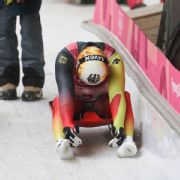|
PYEONGCHANG, South Korea -- The small but lively crowd turned what should have been a predictable event into an everyone-roots-for-everyone affair. On a night when the air (minus-11 Celsius) was colder than the luge track's ice (minus-10), fan shouts of "USA! USA!" erupted from Americans, Germans, Koreans and everyone in between. Lugers from around the world gave each other high-fives and hugs, whether they had won a medal or not. And then there was Felix Loch, the youngest world champion and Olympic gold medalist in the history of men's singles luge and the two-time defending Olympic gold medalist. After skidding on the track and glancing off the wall during his fourth and final run in the singles event Sunday, he lost precious time. Tumbling from first place to fifth, he sat stunned on his sled just past the finish line, holding and shaking his head. In fact, everyone was shaking their heads in disbelief. A history-making, record-tying three-peat was there for the taking for Loch. Then, suddenly, the best slider in the world couldn't slide error-free. "I did a mistake out of Corner 9, and that is one part of the track you are not allowed to do a mistake," Loch told reporters after the final. "But it's only sport, s--- happens."  The headlines are now dominated by three unlikely men: Austria's David Gleirscher, the USA's Chris Mazdzer and Germany's Johannes Ludwig, who won gold, silver and bronze, respectively. This was the equivalent of watching Usain Bolt, in his prime, trip over his own feet in a 100-meter final, or Lionel Messi scoring an own-goal in a World Cup match. Gleirscher had never even won a World Cup race and had never finished better than fourth overall. "[Loch] has always been the favorite, but Felix is also human like any of us," Gleirscher said. "No one could have predicted this." Mazdzer, for his part, went from finishing 13th in back-to-back Olympics, to making history by becoming the first American to win a medal in men's singles luge, helped by a track-record time of 47.534 seconds on his third run. Mazdzer's final slide guaranteed him a medal, finishing second in 3:10.728. He also matched the best finish for USA Luge in any event at the Olympics (the Americans have been second in doubles twice). "I knew I was out of control, I was pushing the limits all four runs," Mazdzer said. "That final trip down was a lot of fun actually. It's weird. This is probably the race that I was least nervous for. I just felt really good about this track, all through training. Going into this last run, even though there's snow in the track, the ice is really hard, I knew I could do it." The sport of luge is a small, tight-knit world, and Mazdzer was keen to credit his peers for helping him during the trial runs. "We've kind of all grown up with each other. We've been competing internationally since we were 13, 14 years old," he said. "I can't say thank you enough to all these people that let me lay in their sleds, that let me try to do different things that brought me to this point."  It was easy to see that comradery in the postrace news conference, with the three medalists smiling between questions, all giddy and loquacious, and looking ready to pinch themselves. All three had the race of their lives. They needed it to beat the legend who was set to tie Georg Hackl's record as only the second person to win Olympic luge gold three straight times. "I'll tell you what's going on in my head. I never made podium during the World Cup and now I am at the top of the podium," Gleirscher said. "I don't really know what's going on. "It's quite unbelievable. It's so incredible that this has happened. I can hardly believe it. It will take me several days to be able to realize it."
|

